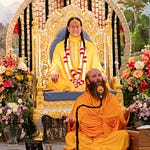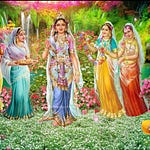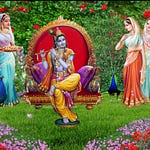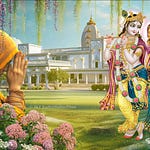Respected devotees of Shri Maharaj ji!
Respected viewers, “Radhe Radhe!”
We'll chant for a few minutes. Spiritually inclined souls, starting tonight and in the coming days, I am going to make a humble attempt to elaborate on a Divine pad from Dainya Madhuri in Prem Ras Madira. It is a pad of humbleness.
Jalaluddin Rumi was a great Muslim saint and in his poem entitled ‘Masnavi’ he relates a wonderful story on humility revealing the heights we must reach if we are to attain our goal of God realization in this human birth.
Moses (from the Christian Bible) was once coming down a mountain. He had been sent by God as a messenger to teach the souls of the world that the only aim of life is to attain God. So as Moses was coming down, he noticed in the distance a shepherd kneeling down with his palms joined. As he approached him, he saw that the man was praying. And so being curious, he paused to listen to him. So the shepherd was saying,
“Almighty beloved Lord, how I yearn to meet You! I wonder what You do for a living. Maybe you herd cows, sheep, or buffaloes. You must get tired from working all day. Please allow me to press Your lotus feet. You must have lice in your clothes. Please let me take them out for You. If you are hungry, I can bring honey from the jungle for You, from the forest. Why don't You take a break? Why don't You have a rest? I can make a bed of flowers for You to lay down.”
Moses couldn't believe his ears. He had never heard anyone addressing God in such an uncouth manner. So incensed and full of self righteousness, he confronted the shepherd, “Who do you think you were just speaking to?”
Startled by the outburst, the shepherd with folded hands replied, “Sir, I was speaking to my beloved Lord!”
So Moses said, “How dare you speak to God like that? Do you think that God would ever have lice in His clothes? How dare you insult Him in this way?”
So, tears welled up in the eyes of the shepherd. And with folded hands, he pleaded, “Yes sir, I have transgressed terribly! I obviously wasn't realizing what I was doing and the gravity of the sin that I was committing, so please tell me how I should atone for this sin that I've committed?”
Moses retorted and he said, “There's no atonement for such a grievous sin as you have committed. You have insulted God!”
Hearing such words, the shepherd was overcome with grief, and leaving behind his blanket, his staff, and his mere belongings on the ground, he walked off crying bitterly begging God to forgive him. Suddenly there was a thundering voice from above,
“Oh Moses, it is not the innocent shepherd who has sinned. In fact, it is you who have sinned! You have offended Me by destroying the pure devotional sentiments of My devotee! If anyone should beg for forgiveness, it is you who should go to him and ask him and beg him for forgiveness!”
Shri Maharaj tells us that as aspiring devotees, we must strive to become innocent and humble just like that shepherd. We must understand that offering some ‘highfalutin’ talk in Sanskrit, Hindi, Latin, English, or any other language in a temple, mosque, or church is not going to earn us anything, because the kingdom of God cannot be earned through words. God is not someone we can fool with our sweet words just as we do with one another in the world. No. We must shed tears of love and longing, and only then He will manifest Himself before us.
There was once an acrobat who earned a living performing his routine before the public. So one day he went into a church and there he saw people kneeling in front of the statue of mother Mary. They had their hands out and they were asking for various things from her, and so being innocent at heart, he thought that for sure mother Mary must fulfill their desires, otherwise why would so many people come begging in front of her? So when everyone left the church, he locked the door from inside, and he decided to try to please mother Mary so she would reward him also. So he began to perform his acrobatics.
And so hearing the thumping and the banging coming from inside the church, the priests rushed over to find out what was going on. Finding the door locked, they peeped in through the side window and saw this man leaping about and his perspiration flying all over. And, so, they were appalled by his antics in such a hallowed place. So they ordered him to open the door right away, and as soon as they entered, the parishioners grabbed hold of him and they were dragging him outside the church. And as he was being dragged outside a light emerged from the statue of mother Mary and she spoke, “All of you priests, all of you are hypocrites, but this acrobat, he's a true devotee for he has a simple and innocent heart!
There are numerous examples of Saints such as Dhanajat, Mira, Kabir, Tukaram, etc., who succeeded in attaining God on the basis of simplicity, innocence, and humility, leaving behind those great scholars of the Vedas and other scriptures who are unable to shed even a single tear. We must understand that God's grace is not dependent on scriptural knowledge. In fact, even those great scholars of the Vedas, they must renounce their knowledge and become childlike and innocent, and only then can they receive the vision of God.
History is evidence of the fact that only a handful of Saints were, in fact, great scholars. Ninety nine percent of the time, we will find that it is the illiterate, simple hearted, innocent souls who realized God. Why? Why is that so? An absence of pride. They have realized that they have nothing to be proud of. They have no wealth. They possess no wealth to intoxicate them. No scholastic merit to flaunt. No prestige? No status in the eyes of people, in the eyes of society? No honor? No. All of these things which foster pride in the heart as such. Only such individuals with a simple, innocent heart can sincerely call out to God and say, “I am the greatest sinner! Oh, my lord!” Only they can. So simplicity, humility is a virtue in devotion.
An ignorant man tried hard, but he was not good at any kind of work. He was very fond of food, though. His family would often condemn him and taunt him for being a worthless ‘’good for nothin’. A day came when his family nonchalantly advised him to go to a nearby temple and live with the sages over there. “Woah. That's a great idea,” he thought. So off he went cheerfully to the temple. So when he reached there he asked the head sage over there, “Can I stay with you and serve you?”
So the wise sage said, “Well, as the Lord wishes.” So he let him in. And so this man, he was very happy with his stay and in the company of the noble sage doing just simple chores around the temple. So one day the sage and his disciples had to go out somewhere and so this man was asked to prepare food for bhog. He was specifically instructed that he could only have his meal after he had offered bhog. The man had never cooked, however he thought, “Let me try to do something,” and he did. And after he prepared the bhog, he called upon God, 'Hey Prabhu! Please come and accept this offering! I am too hungry to wait for long!”
So, suddenly he saw that a man and a woman were coming toward him. He soon learned that They were Ram and Sita. He was a bit taken aback because he had prepared food for only one God, but two turned up! So with a heavy heart, he offered whatever he had prepared and ate whatever little was left over. So the next day, he prepared food for two. To his surprise, three Gods turned up, Ram, Sita, and Lakshman. And so he was a bit upset, but he went ahead and offered the food anyway, and ate whatever few morsels that were left over.
The next day, he complained to the sage and he said, “More and more Gods are turning up, and therefore I need more groceries to be able to cook for Them!” So the sage thought that the man must be eating it all, and he did not question him any further. So on the third day, when he prepared the food, the bhog, bewildered, God came with Sita, Lakshman, Bharat, Shatrughna, and Hanumanji, and once again he was left with very little food for himself.
So again he complained to the sage and he said, “Believe it or not, but it's just the numbers are growing day after day, and so I'm having to cook more food and therefore I need more groceries!”
So at this point, the sage thought he became a little suspicious and he thought that he must check on this man to really find out what he's up to. And, so that's what he decided to do. Meanwhile, because the man was dismayed with the increasing number of Gods turning up every day, he thought, “That's it! I'm not cooking today!” And so he sat down and he called God, “God please come!” And sure enough, Ram Sita Lakshman Bharat Shatrugna, Hanumanji, and 10 Devatas came. And he said, “Ah-ha! I knew you would bring more guests. I just knew it. So I didn't cook anything today. Why didn't you all help me cook? And you know, I need food for myself too. I've been starving for the past so many days!”
So They all started laughing and blessed him, and the sage who was actually hiding behind the tree ran in tears to this man. And he realized that this simpleton, even though he might not have all the knowledge that the rest of us have, yet his simplicity and innocence that he possesses, because of that God couldn't resist and He just manifested Himself. So just as we think that to become God realized, we must be soaked in spiritual knowledge. No!
Yes, of course knowledge is important. However, the qualities that are most adored by God, which make Him not resist us are simpleness, innocence, humility. So let us think about this pad.
वंशीवारे साँवरे, सुनु ।
Vamshīvāre samvare sunu.
“Oh, my dark complexioned, enchanting flute Player. Please, listen to my prayer!”
लख चौरासी योनि चराचर, चलत पिराने पाँव रे ।
Lakh chaurāsī yoni charāchar, Chalat pirāne pāmv re.
“I have wandered extensively through the 84 lakh species of life and am totally exhausted!”
It is an eternal fact that we, as souls under the sway of maya have been wandering in ignorance since time immemorial. Cycling through birth and death, reincarnating into various forms in the 8.4 million species, life after life after life after life, since unimaginable time. We may wonder, “Why?” What could be the reason that we have been relentlessly revolving through the cycle of birth and death, birth and death, birth and death. We have taken birth in different life forms over and over and over again. What could be that reason? If we gather the 8,000,000,000 humans in existence at one place and ask them what they are searching for in life, we will end up with more than 8,000,000,000 answers to this one question. Because every individual will give multiple answers to this one question. It is a fact that in one day alone, there's so many things that we desire. So if anyone were to start noting down the answers to this one question for all the 8,000,000,000 humans in existence, they would continue to write and write and write and write and write and never end and never stop. Such is the extent of desires.
The Bhagwatam tells us,
“If there is any individual who was given all the luxuries, all the opulence, and all the wealth and prestige and everything of this earth planet, even so, his desires will continue to multiply.”
The Mundok Upanishad tells us,
“Mountains are big, bigger than the mountains is the ocean, bigger than the ocean is the sky above us, bigger than the sky is God.”
There can't be anything greater than God. But this verse goes to say,
“There is something even greater than God and that is human desire, trișhņa.”
It is so great that even though God, that unknowable God can be known, that inconceivable God can be conceived, and that unreachable God can be reached, but since eternity until now, there has not been a single individual nor will there ever be one who has become completely satisfied by acquiring material things, material luxuries, material pleasures. No.
These desires are of five kinds. There are five sense organs, and there are five subjects. Sound, smell, taste, touch, and hearing - there are five. And how great are these desires? So the Vedas tell us, “The deer meets its end, because of its desire for musical sound. And the bee succumbs to its desire for sweet fragrance. The fish dies because of its desire for taste. The moth falls victim to the flames, and the elephant becomes caught in the trap due to its desire to roll around in the cool mud.”
Now these creatures, they meet their end attempting to fulfill only one desire, so what to speak of humans? All of us are constantly tormented by all five desires. All five desires! Yes. Ved Vyas tells us that these five desires that we have as humans are like the five sweethearts of a man, and each one is trying to attract and possess their man. In the same way, in trying to allure us, these desires bring us to complete ruin. This is what Ved Vyas says.
Shri Maharaj Ji tells us that as individuals we have only one desire. That's it. Only one desire and that is a desire for happiness of the self. That's it. There's only one desire, and this is also revealed in the scriptures. Through our every endeavor, we're seeking only one thing, only one fulfillment, and that is happiness of the self. That's it. Every action that we perform is motivated by only one desire, and that is a desire for happiness, that is, there's only one. That's it. There's only one desire. So any answer rather you may give to this one question, what do you desire? What you are searching for in life will have only one motive, and that is the desire for happiness.
You may say, “I want money! I want prestige! I want status! I want a prestigious car! I want a great job, a high earning job, whatever.” There's only one. All of these things are motivated by only one desire and that is the desire for happiness. Anything that you may want in life has only one motive and that is happiness. And this is not something that was taught to us by our parents, no, or our teacher in school, no. This is a natural knowledge that we as individuals possess. It's inherent. It's innate within each and every one of us to seek it, to want it, to search for it, and we do it every living moment. That is our stark reality. We seek it with our every breath. That's what we desire. Why? Well, the scriptures tell us because we are a fraction of that fractionless God who is absolute bliss personified. Yes. And so the science is very simple to understand. It is that every part has a natural love for its whole. So we are a fraction of God.
So the Vedas, Gita, Bhagwatm, Brahm Sutra also tell us that we are a fraction of God, and so we desire perfection just as all the flames of a fire, they rise upward toward the sun. All the rivers, they flow toward the ocean, and we naturally desire God's love. Now from this you may conclude that perhaps our material pursuit for happiness, for perfect happiness is the reason that we've been revolving in the cycle of life and death, but that's only part of the equation. Let us try and understand the underlying reason scientifically. Everyday in our daily prayer, when we recite the daily prayer, the beginning prayer, we utter this one word, “Pap karte karte antahakaran itna malin ho chuka hai.” Let us think about this. The internal machinery or the mechanism consisting of the mind, the intellect, and our sanskars. What are sanskars? There are subtle imprints or reflections on the mind due to the activities of our past lives. So the internal mechanism consisting of the mind, the intellect, and our sanskars collectively is known as the antahakaran.
And this antahakaran accompanies the soul after death. So all of our thoughts and all of our actions accompany the soul through the cycle of life and death until the point of God realization. This is why the scriptures tell us that the moment an individual realizes God, all his bonds are severed. All of his karmas of his unlimited past lifetimes are destroyed at that moment, and all the doubts they cease. So this antahakaran which accompanies the soul after death is the actual performer of actions. It is the performer of actions. However, it receives power or energy by its association with the soul. Without the energy or the power of the soul, it is lifeless. Of itself, it is lifeless just like a lump of clay. So it is just lifeless. So this antahakaran, ‘antaha’ means ‘internal’, and ‘karan’means ‘that which works’, so ‘antahakaran’ means ‘internal machinery.. Now this antahakaran has two facets or two partitions: the mind and the intellect. Sankhya states that it has three: mind, intellect, and ego, and Adwait Vedant states four: mind, intellect, reflections of the inner self, and ego. But for our purpose, Shri Maharaj Ji tells us, we will look at it as having two partitions: mind and intellect; so two, mind and the intellect. So these combined make the antahakaran, internal machinery. So how does the system work? What does the mind do?
Let us think about it. So the mind first and foremost grasps the objects of the senses with the help of the senses. So sight, smell, sound, taste, and touch, it grasps the objects with the help of the senses. Without the involvement of the mind, the senses are essentially useless. They cannot do anything on their own. So just as if the mind is preoccupied, then our senses are not working. We don't hear. We don't see. We don't smell anything. If we fall asleep attending a discourse or if we fall asleep during a kirtan session, then what will happen? The words will definitely be entering our ears. However, we will not understand anything. We will not register anything in our head because our mind isn't there. It's asleep. So without the involvement of the mind, the senses cannot do anything. And just as an example, once Ramkrishna Paramhans was going to partake in a rath yatra. However, by the time he got there, it had moved along, and so he was late. And so there was a man sitting on the side of the road doing some artwork, an artist.
So Ramakrishna Paramhans asked him, “Did you see a rath yatra go by?”
And the man said, “No, I didn't. I didn't hear anything. I didn't see anything. I didn't notice anything.”
So another man who was sitting there said, “How can you lie to such a great Saint?”
And the man said, “No, I'm not lying. I am honestly telling you that I honestly didn't see or hear anything!”
Now one can imagine the commotion and hundreds of people chanting, dancing. There's so much frenzy, so much commotion, but even so, this man was unaware of whatever was going on in the surroundings. Why? Because his mind was so engrossed in doing the artwork that he paid no attention whatsoever. So Ramkrishna Paramhansi sat down there and went into samadhi and he saw that in fact this man was telling the truth.
And he said, “People call me Paramhans, but you are a true Paramhans, oblivious to whatever was going on around you in the external surroundings. You were so engrossed in working on this art.”
So in other words, if the mind is not there, the mind is preoccupied, then the senses are useless. So then, how does this mind work? What does it do? So it generates options about whatever is in front of it. Is this a woman or a man? Should I look upon this person with love, with hate, or with indifference? Will my self interest be helped or will my self interest be harmed? At this point, the mind relays this information to the intellect.
You see, the mind has two facets as I explained: One is the desiring mind and the other is the discriminating mind. The desiring mind is the mind and the discriminating mind is the intellect. So now the mind relays the information to the intellect which is the central government, and then the intellect makes a decision. This person is no one to you. You don't know that person. Just move on. So what do you do? You just pass that person by. In the same way, when you go to the market, what do you do? You keep passing people, you keep passing them up. Why? Because the intellect keeps judging and keeps telling you, “You don't know this person, just move on, keep moving, keep moving, keep moving.” Therefore you just keep moving through the market until, of course, you meet somebody that you know who's familiar, and then you immediately stop and you greet them and you talk to them, “Hi, how are you? When did you come to Austin? Etc. How did that happen? Because the intellect is telling the mind, this person is familiar to you therefore, the mind tells the senses, “Smile. Look at them with affection.” The mind is telling the senses. Right? So the intellect is the governor. The intellect governs what the mind does and the mind, in turn, governs what the senses do. This is how it works. So the work of the mind takes place twice. First, it grasps the objects of the senses with the help of the senses first, and then it relays the information to the intellect, and then the intellect will pass the judgment. It comes back to the mind, and the mind then tells the senses to act accordingly.
Now what is the practical implication of this? Let us think about it. Now someone who is wise also sees the objects of the senses, what happens? His mind relays the information to the intellect. Now the intellect being firm in the knowledge of the Guru, the spiritual master, takes the decision, “This object is not mine. It cannot give me the fulfillment that I'm seeking.” So then the intellect tells the mind, “Don't divert the senses there. Don't direct the senses over there.” And so the mind does not object nor do the senses. Why? Because they are at the mercy of the intellect. They're mere servants. They're not going to go against what the intellect tells them. Of course not. So they simply follow. Just like if you could instruct a horse to follow a certain particular path, it does so. It does not object. The driver of a car turns the wheels onto a certain road, the wheels do not object. Their job is to keep moving irrespective of the direction.
In the same way, the mind and the senses, they do not object. They simply follow the instructions of the intellect. So everything depends on the intellect is what I'm trying to say. Intellect is most important, and this is why we need the power of discrimination or the intellect. And in the absence of this power of discrimination, our common sense of infinite lifetimes tells us that the world is ours. The world is ours and this is what happens in the world. People are still running after the world even in old age, even after retirement. If a man doesn't have a wife and children, what does he do? He adopts a wife and children and serves them, adopts a child and spends years and years raising that child. In this way, what do we do? We bring about the frustrations and anxieties and the tensions and all of that, and we make no effort to get out of this mess.
Shri Maharaj says, “I tell people that now your son has grown up, he's earning, why don't you give up all those family responsibilities and spend time in sadhana?”
But, “Maharaji, you know, my son is still a child. He's not capable of, like, managing the affairs of the business.”
So Maharaji says, “So what do you expect your child to grow up and become your father? Is that what you're hoping for? Your son will become your father?”
“No, Maharaji. What you were saying is true, but you know the intellect, it wants to go by its practice of so many lifetimes. It doesn't cooperate. It doesn't listen.” So Shri Maharaj says such individuals, they can never make any progress in their spiritual life. Only the one who has actually dedicated himself to a true Divine guide can make spiritual headway, otherwise not.
And this is why Shri Krishna says in the Gita, “Oh, Arjun, give your mind to Me!”
So Arjun thought, “Okay. I'll give my mind to me. After all, I'll keep the intellect because in the intellect is the same thing. It's the main thing.
So Shri Krishna said, “No. Give the mind to Me.”
And as soon as Arjun had that thought, Shri Krishna said, “Give your intellect to Me as well. Give your mind to Me as well because giving the mind and the intellect constitutes surrender.”
Surrender. And when you give both of these, then that denotes you've given everything, and then you follow the instructions and the directions of the personality to whom you have submitted your mind and your intellect. Now if that personality is from a higher plane, then they will take you there. They'll elevate you. However, if they are a smoker, a gambler, an alcoholic, or a thief, then they'll keep you in the world. That's it. That's what will happen. So Shri Maharaj tells us that it's the intellect. The reason that we're in this quandary is because of our intellect.
So we will have to be very careful until our intellect becomes decisive, and a decisive intellect means until we come face to face with God, until we attain Divine love, that is when our intellect becomes decisive. Until that point, there's always the constant danger of downfall. There's constant danger of downfall. You may have rowed 190 yards across a river that's 200 yards wide, but if you decide to leave the safety of the boat and jump to the other shore, you might still drown. You might still drown. So until you come to the shore in the safety of the boat, never harbor such pride that you know it all. No. That's not how it should be. So it's the intellect. Shri Maharaj tells us, as described in the Bhakti Rasamrit Sindhu, that there are devotees who have reached a high state in their devotion. They have reached bhao bhakti. Even if somebody reaches that state, they may still fall from that elevated state of spiritual consciousness or Divine love consciousness that what to speak of us ordinary souls who are pursuing sadhana or preparatory devotion. How? What to speak of us? We may have seen devotees who were once so drowned and so immersed in devotion, crying and dancing in devotion. And what happened to them? They've drifted. They're back in the world totally absorbed, totally fallen back into the world, “How is he these days?”
“Oh, he's in a very pitiable state.”
“What happened? How did that happen?”
So Shri Maharaj tells us just like a person, even a student, may have passed high school in first division and then intermediate second division pursuing a degree a bachelor's degree, third, and while pursuing a master's, what happened? Failed. What happened? This happens. This is not a new thing. It happens. Right?
So people who do not prepare themselves or who do not make an effort to prepare for the changing situations are bound to face or to bear such consequences. So Shri Maharaj Ji tells us that we should not harbor pride that we know it all. We may have heard Shri Maharaj's lecture a hundred times. Keep on hearing the same lecture. It doesn't matter until we see Radha Krishna in front of us. We should never ever think, “Oh, I think I know it. I've heard it so many times.”
No.
We're not such expert snake charmers that we can be so confident that we will remain unaffected by the snake bite. No. We first have to become experts at learning the appropriate mantras. Yes. And recognizing those medicinal potions first. Yes. And then we can challenge the snakes. Until that happens, we may find ourselves dead in the first try. So it is the intellect that is the main culprit. It is the culprit. It is the intellect that has deprived us of our spiritual goal over infinite lifetimes. Shri Maharaj tells us that it's the underlying reason is the intellect, of course, we understand now, but the underlying reason is ignorance. And ignorance appears in devotees in guise of self superiority. In the learners of scriptural knowledge, it appears as pride of learning. In those who preach the spiritual subjects and sing and chant devotional songs, it appears as a hypocritical display or posing of a saintly attitude. And in ordinary people, that ignorance manifests as a desire for name and fame.
So pride is the main form of ignorance. We must understand this, and Shri Maharaj tells us that knowledge in the spiritual sense, knowledge does not mean learning or intelligence, and ignorance does not mean illiteracy or stupidity. No. What does knowledge in the spiritual sense mean? It means understanding of the Divine relationship with God. Understanding of the Divine relationship is knowledge in the spiritual sense, and forgetting the Divine relationship in the spiritual sense is ignorance. So knowledge in the spiritual sense is spiritual consciousness, devotional consciousness, and ignorance is material consciousness. So what was the reason that we've been revolving through life after life after life in different forms? It is ignorance. That is the reason. This is what Shri Maharaj has explained to us.
So the remaining lines I will explain over the next few days.









